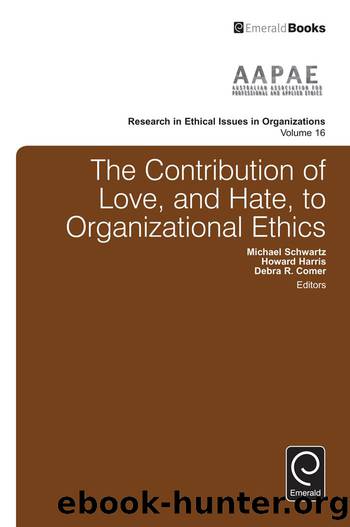The Contribution of Love, and Hate, to Organizational Ethics by Schwartz Michael;Harris Howard;Comer Debra;

Author:Schwartz, Michael;Harris, Howard;Comer, Debra;
Language: eng
Format: epub
Publisher: Emerald Publishing Limited
Published: 2016-10-24T00:00:00+00:00
Knowing and Understanding Economics
Economics is something in which we live: we are inside economics. From the morning when we wake up, until night when we fall asleep, we live immersed in a ceaseless flow of economic events. Having breakfast, washing and dressing, going to work, taking care of the house, using public transport, cooking, eating, studying, exercising, travelling, having fun are just some of the daily activities in which economics is always somehow present and active. We could say that economics never rests, even when we sleep.
Nearly always, when needs or desires emerge, the method employed to satisfy them requires the use of resources which by their nature are scarce. The activity that is intended to meet the unlimited human needs using scarce resources is economic activity. One can therefore conclude that economic phenomena are derived from the incessant research that human beings do to fill their innate sense of limitation (Raskin et al., 2002; Scitovsky, 1976; Wilson, 1972).
In other words, we feel a vacuum and we try to fill it using something that is somehow available either directly or indirectly. We constantly try to meet some need using the resources at our disposal or trying to get new ones. Economics in its essential meaning handles this relationship between unlimited needs and scarce resources useful to satisfy them (Hamilton & Denniss, 2005). It is important to note that in this view money simply acts as a tool that promotes and facilitates trade and it is not at all the end of the economic activity.
If we lived in the Garden of Eden, economics would be of no use because, in the absence of the condition of shortage, each need would find immediate and complete satisfaction. Indeed, in this case not even the need arises. The human being would be perfectly integrated in his divine nature and therefore absolutely free from the limits and vulnerabilities of a physical body.
Out of that heavenly experience, what exactly is quality of life? It is more money, greater quantities of goods or is it something more complex and less tangible? As various studies on happiness show, what makes people happy, above a given standard of living, is more intangible than tangible, and the belief that the more we have, the more happy we are is a myth rather than reality (Seligman, 1992). In other words, we are redefining the concept of well-being beyond the limits imposed by a materialistic point of view and finally integrating it with aspects related to the real experience of feeling good, by understanding ourselves, the others and the nature (Shapiro, Carlson, Astin, & Freedman, 2006).
Economy and ecology originate from the same semantic root of Greek origin Oikos, meaning home. Ecology refers to the study and understanding of how in a âhomeâ everything is interconnected, interrelated and interdependent, how everything that is part of the ecosystem is made up of the same elements.
The house Earth is a living system that works in perfect harmony according to its own dynamics of connectivity, imagination, creativity and intelligence.
Download
This site does not store any files on its server. We only index and link to content provided by other sites. Please contact the content providers to delete copyright contents if any and email us, we'll remove relevant links or contents immediately.
Tools of Titans by Timothy Ferriss(7926)
Change Your Questions, Change Your Life by Marilee Adams(7448)
Deep Work by Cal Newport(6667)
Man-made Catastrophes and Risk Information Concealment by Dmitry Chernov & Didier Sornette(5733)
Playing to Win_ How Strategy Really Works by A.G. Lafley & Roger L. Martin(5629)
Digital Minimalism by Cal Newport;(5455)
Big Magic: Creative Living Beyond Fear by Elizabeth Gilbert(5423)
The Slight Edge by Jeff Olson(5238)
Ego Is the Enemy by Ryan Holiday(5044)
The Motivation Myth by Jeff Haden(5044)
Stone's Rules by Roger Stone(4909)
The Laws of Human Nature by Robert Greene(4841)
Tuesdays with Morrie by Mitch Albom(4466)
Rising Strong by Brene Brown(4242)
Eat That Frog! by Brian Tracy(4227)
Skin in the Game by Nassim Nicholas Taleb(4029)
The Money Culture by Michael Lewis(3914)
Bullshit Jobs by David Graeber(3894)
Skin in the Game: Hidden Asymmetries in Daily Life by Nassim Nicholas Taleb(3781)
